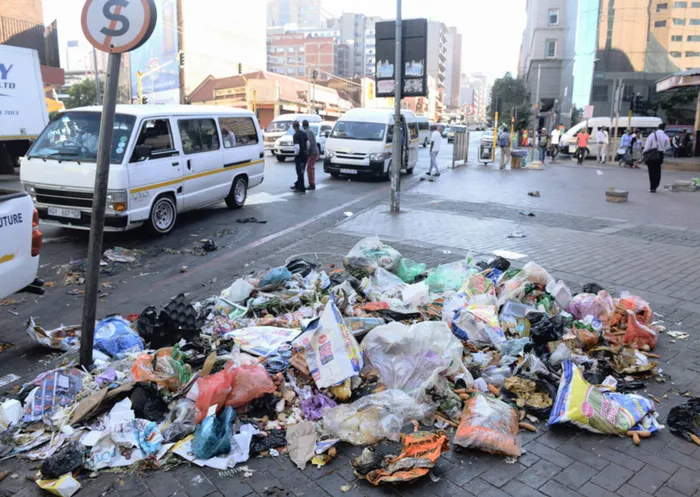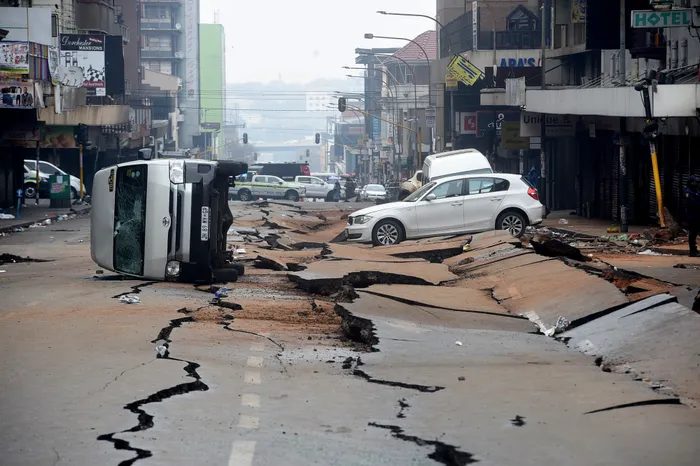
The struggles of Johannesburg: Unemployment, inequality, and infrastructure challenges
Image: Boxer Ngwenya
South Africa’s largest city and economic heartbeat has long been regarded as a symbol of resilience and opportunity. Yet, beneath its shimmering skyline and bustling streets lies a complex reality marked by urban decay and social upheaval.
Johannesburg’s history is rooted in the gold rush of the late 19th century, which spurred rapid growth and attracted diverse populations.
However, this boom created stark contrasts: affluent neighbourhoods coexisted alongside sprawling informal settlements.
Johannesburg faces new challenges today: skyrocketing unemployment, stark inequality, and a severe housing crisis.

Johannesburg’s history is rooted in the gold rush of the late 19th century, which spurred rapid growth and attracted diverse populations.
Image: File / Itumeleng English / Independent Newspapers
According to affected residents and opposition parties, many peripheral neighborhoods and informal settlements have suffered from neglect, with infrastructure such as roads, water, and electricity remaining unreliable in some areas.
Sanitation problems and inadequate public services have further fueled perceptions of urban decline.
The city’s state is visibly deteriorating. Pothole-ridden roads, aging buildings, and crumbling public transportation systems are clear indicators of neglect.
Once symbols of Johannesburg’s grandeur, historic districts, and landmarks have fallen into disrepair—emblematic of insufficient investment and maintenance.
Crime, gang violence, and social unrest continue to plague many communities.
While Johannesburg remains South Africa's financial hub, specific sectors have stagnated. High unemployment rates, especially among youth, contribute to economic despair and further hinder development efforts.
Challenges of Systemic Neglect
Systemic failures are at the core of Johannesburg’s ongoing struggles, ActionSA’s Lebo Modukanene highlighted alarming levels of deprivation, noting that over 50 informal settlements in Region A lack basic water and sanitation services.
“In neighbourhoods like Diepsloot, streetlights have been out for decades, and crime thrives in the darkness,” he said.
He also pointed out that “in Orange Farm, residents line up daily for water, and in Bramfischerville, floods persist without intervention.
"This is not merely neglect; it represents a systemic failure,” said Modukanene.
Waste management issues, deteriorating roads, and vandalism exacerbate the city’s woes.
Dr Mgcini Tshwaku, Johannesburg’s MMC of Public Safety, cited theft of copper wiring from traffic lights as a cause of long-term failures and safety hazards.
The City acknowledged the scale of the problem but stated the enormous financial needs.
Johannesburg’s mayoral spokesperson, Chris Vondo, explained to IOL that an estimated R200 billion is required to overhaul the city’s infrastructure—funds currently out of reach due to budget constraints.
Mayor Dada Morero reported that “the city’s road network is rapidly deteriorating. An estimated R16 billion is needed to restore basic road infrastructure, but funding gaps mean potholes and degraded surfaces are commonplace.”
He added, “The power grid is fragile, hampered by theft, vandalism, and aging infrastructure. There is a backlog of R170 billion for maintenance and upgrades, leaving many areas without reliable electricity.”
The water infrastructure faces similar challenges, Joburg Water CEO Ntshavheni Mukwevho cited a backlog of R27 billion for renewal efforts.
“Over 60% of Johannesburg’s water network has exceeded its designed lifespan, leading to frequent pipe bursts and supply disruptions.”
The budget projected an operating revenue of R84.8 billion, operating expenditure of R80.7 billion, and a surplus of R4.1 billion before taxation and capital grants.
The R8.7 billion capital budget is expected to grow to R26.2 billion over the medium term.
Arnolds mentioned that key revenue sources include electricity (R25.6 billion), water and wastewater (R20 billion), property rates (R18.1 billion), refuse removal (R3.3 billion), and the national fuel levy allocation (R4.57 billion), which is set to increase by 10.8%.
She described the budget as “fully funded, pro-poor, and pro-growth—a roadmap for transformation and resilience.”
She stated that the city refuses to allow economic pressures to further marginalize its residents.
Notably, the controversial prepaid electricity surcharge will remain unchanged at R200 (excluding VAT), as a deliberate effort to protect the poor from rising energy costs.
thabo.makwakwa@inl.co.za
IOL Politics
